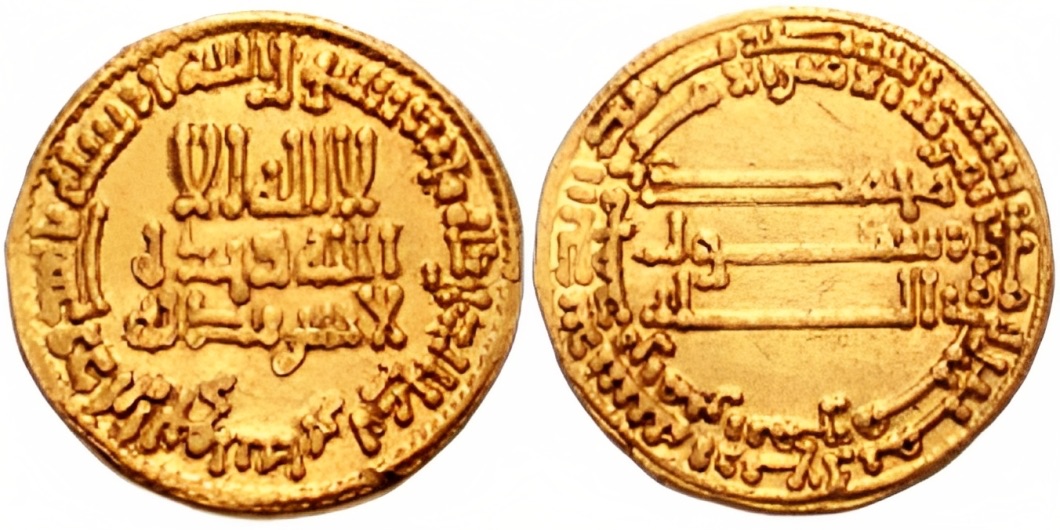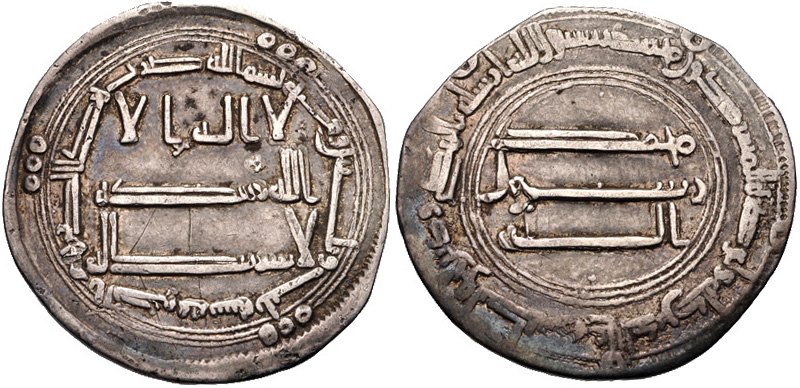|
Harun Al-Rashid
Abu Ja'far Harun ibn Muhammad al-Mahdi ( ar , أبو جعفر هارون ابن محمد المهدي) or Harun ibn al-Mahdi (; or 766 – 24 March 809), famously known as Harun al-Rashid ( ar, هَارُون الرَشِيد, translit=Hārūn al-Rashīd) was the fifth Abbasid caliph of the Abbasid Caliphate, reigning from September 786 until his death. His reign is traditionally regarded to be the beginning of the Islamic Golden Age. His epithet "al-Rashid" translates to "the Orthodox", "the Just", "the Upright", or "the Rightly-Guided". Harun established the legendary library Bayt al-Hikma ("House of Wisdom") in Baghdad in present-day Iraq, and during his rule Baghdad began to flourish as a world center of knowledge, culture and trade. During his rule, the family of Barmakids, which played a deciding role in establishing the Abbasid Caliphate, declined gradually. In 796, he moved his court and government to Raqqa in present-day Syria. A Frankish mission came to offer ... [...More Info...] [...Related Items...] OR: [Wikipedia] [Google] [Baidu] |
Zubaidah Bint Ja'far
Zubaidah bint Ja`far ibn al-Mansur () (died 26 Jumada I 216 AH / 10 July 831 CE) was the best known of the Abbasid princesses, and the wife and double cousin of Harun al-Rashid. She is particularly remembered for the series of wells, reservoirs and artificial pools that provided water for Muslim pilgrims along the route from Baghdad to Mecca and Medina, which was renamed the Darb Zubaidah in her honor. The exploits of her and her husband, Harun al-Rashid, form part of the basis for ''The Thousand and One Nights''. Biography Zubaidah's birthdate is unknown; it is known that she was at least a year younger than Harun. Her father, Ja'far was a half-brother of the Abbasid caliph al-Mahdi. Her mother, Salsal, was an elder sister of al-Khayzuran, second and most powerful wife of al-Mahdi, and mother of the future caliphs Musa al-Hadi and Harun al-Rashid. Zubaidah is a pet name, given by her grandfather, caliph al-Mansur. The name means "little butter ball". Zubaidah's real name at bi ... [...More Info...] [...Related Items...] OR: [Wikipedia] [Google] [Baidu] |
Al-Mahdi
Abū ʿAbd Allāh Muḥammad ibn ʿAbd Allāh al-Manṣūr ( ar, أبو عبد الله محمد بن عبد الله المنصور; 744 or 745 – 785), better known by his regnal name Al-Mahdī (, "He who is guided by God"), was the third Abbasid Caliph who reigned from 775 to his death in 785. He succeeded his father, al-Mansur. Early life Al-Mahdi was born in 744 or 745 AD in the village of Humeima (modern-day Jordan). His mother was called Arwa, and his father was al-Mansur. When al-Mahdi was ten years old, his father became the second Abbasid Caliph. When al-Mahdi was young, his father needed to establish al-Mahdi as a powerful figure in his own right. So, on the east bank of the Tigris, al-Mansur oversaw the construction of East Baghdad, with a mosque and royal palace at its heart. Construction in the area was also heavily financed by the Barmakids, and the area became known as Rusafa. According to reports, he was tall, charming, and stylish; he had tan skin, a long fo ... [...More Info...] [...Related Items...] OR: [Wikipedia] [Google] [Baidu] |
Banu Hashim
) , type = Qurayshi Arab clan , image = , alt = , caption = , nisba = al-Hashimi , location = Mecca, Hejaz Middle East, North Africa, Horn of Africa , descended = Hashim ibn Abd Manaf , parent_tribe = Quraysh , branches = * Banu Hasan * Banu Husayn *Banu Abbas , religion = Islam , ethnicity=Arab The Banū Hāshim ( ar, بنو هاشم) is an Arab clan within the Quraysh tribe to which the prophet Muhammad belonged, named after Muhammad's great-grandfather Hashim ibn Abd Manaf. Members of this clan, and especially their descendants, are also referred to as Hashimids, Hashimites, or Hashemites, and often carry the surname . These descendants, and especially those tracing their lineage to Muhammad through his daughter Fatima, hold the traditional title of (often synonymous to ). From the 8th century on, Hashimid descent came to be regarded as a mark of nobility, and formed the basis upon which many dynasties legitimized the ... [...More Info...] [...Related Items...] OR: [Wikipedia] [Google] [Baidu] |
Abbasid Dynasty
The Abbasid dynasty or Abbasids ( ar, بنو العباس, Banu al-ʿAbbās) were an Arab dynasty that ruled the Abbasid Caliphate between 750 and 1258. They were from the Qurayshi Hashimid clan of Banu Abbas, descended from Abbas ibn Abd al-Muttalib. The Abbasid Caliphate is divided into three main periods: Early Abbasid era (750–861), Middle Abbasid era (861–936) and Later Abbasid era (936–1258). A cadet branch of the dynasty also ruled as ceremonial rulers for the Mamluk Sultanate as Caliph (1261–1517), until their conquest by the Ottoman Empire. Ancestry The Abbasids descended from Abbas, one of Muhammad's companions (as well as his uncle) and one of the early Qur'an scholars. Therefore, their roots trace back to Hashim ibn 'Abd Manaf and also Adnan in the following line: Al-‘Abbas ibn Abdul-Muttalib ibn Hashim ibn Abd Manaf ibn Qusai ibn Kilab ibn Murrah ibn Ka'b ibn Lu'ay ibn Ghalib ibn Fihr ibn Malik ibn An-Nadr ibn Kinanah ibn Khuzaima ibn Mudrik ... [...More Info...] [...Related Items...] OR: [Wikipedia] [Google] [Baidu] |
Al-Tabari
( ar, أبو جعفر محمد بن جرير بن يزيد الطبري), more commonly known as al-Ṭabarī (), was a Muslim historian and scholar from Amol, Tabaristan. Among the most prominent figures of the Islamic Golden Age, al-Tabari is known for his historical works and his expertise in Qur'anic exegesis (), but he has also been described as "an impressively prolific polymath".Lindsay Jones (ed.), ''Encyclopedia of religion'', volume 13, Macmillan Reference USA, 2005, p. 8943 He wrote works on a diverse range of subjects, including world history, poetry, lexicography, grammar, ethics, mathematics, and medicine. His most influential and best known works are his Quranic commentary, known in Arabic as , and his historical chronicle called ''History of the Prophets and Kings'' (), often referred to as ("al-Tabari's History"). Al-Tabari followed the Shafi'i madhhab for nearly a decade before he developed his own interpretation of Islamic jurisprudence. His understandi ... [...More Info...] [...Related Items...] OR: [Wikipedia] [Google] [Baidu] |
Al-Mu'tasim
Abū Isḥāq Muḥammad ibn Hārūn al-Rashīd ( ar, أبو إسحاق محمد بن هارون الرشيد; October 796 – 5 January 842), better known by his regnal name al-Muʿtaṣim biʾllāh (, ), was the eighth Abbasid caliph, ruling from 833 until his death in 842. A younger son of Caliph Harun al-Rashid (r. 786–809), he rose to prominence through his formation of a private army composed predominantly of Turkic slave-soldiers (, sing. ). This proved useful to his half-brother, Caliph al-Ma'mun, who employed al-Mu'tasim and his Turkish guard to counterbalance other powerful interest groups in the state, as well as employing them in campaigns against rebels and the Byzantine Empire. When al-Ma'mun died unexpectedly on campaign in August 833, al-Mu'tasim was thus well placed to succeed him, overriding the claims of al-Ma'mun's son al-Abbas. Al-Mu'tasim continued many of his brother's policies, such as the partnership with the Tahirids, who governed Khurasan and Ba ... [...More Info...] [...Related Items...] OR: [Wikipedia] [Google] [Baidu] |
Heir Presumptive
An heir presumptive is the person entitled to inherit a throne, peerage, or other hereditary honour, but whose position can be displaced by the birth of an heir apparent or a new heir presumptive with a better claim to the position in question. Overview Depending on the rules of the monarchy, the heir presumptive might be the daughter of a monarch if males take preference over females and the monarch has no sons, or the senior member of a collateral line if the monarch is childless or the monarch's direct descendants cannot inherit (either because they are daughters and females are completely barred from inheriting, because the monarch's children are illegitimate, or because of some other legal disqualification, such as being descended from the monarch through a morganatic line or the descendant's refusal or inability to adopt a religion the monarch is required to profess). The subsequent birth of a legitimate child to the monarch may displace the former heir presumptive ... [...More Info...] [...Related Items...] OR: [Wikipedia] [Google] [Baidu] |
Al-Qasim Ibn Harun Al-Rashid
Al-Qāsim ibn Hārūn al-Rashīd () was an Abbasid prince, the third son of the Abbasid caliph Harun al-Rashid (r. 786–809), and for a time third-in-line to the Abbasid throne. Biography Qasim was Harun's third son, born to a slave mother named Qasif. Sukaynah, Harun's eldest daughter, was also Qasim's full sister. In his youth, Qasim was placed under the tutorship of the influential general Abd al-Malik ibn Salih. Thanks to Abd al-Malik's influence with Harun, Qasim was named as third in line of succession in 802 or 803, shortly after the so-called "Meccan documents" which established the precedence in succession of his elder brothers Muhammad (the caliph al-Amin, ) and Abdallah (the caliph al-Ma'mun, ). On this occasion, Qasim also received the honorific epithet () al-Mu'tamin (), but Harun also stipulated that Abdallah could, once caliph, alter the succession in favour of his own sons. In addition, Harun entrusted Qasim with the command over the frontier provinces with the ... [...More Info...] [...Related Items...] OR: [Wikipedia] [Google] [Baidu] |
Al-Ma'mun
Abu al-Abbas Abdallah ibn Harun al-Rashid ( ar, أبو العباس عبد الله بن هارون الرشيد, Abū al-ʿAbbās ʿAbd Allāh ibn Hārūn ar-Rashīd; 14 September 786 – 9 August 833), better known by his regnal name Al-Ma'mun ( ar, المأمون, al-Maʾmūn), was the seventh Abbasid caliph, who reigned from 813 until his death in 833. He succeeded his half-brother al-Amin after a civil war, during which the cohesion of the Abbasid Caliphate was weakened by rebellions and the rise of local strongmen; much of his domestic reign was consumed in pacification campaigns. Well educated and with a considerable interest in scholarship, al-Ma'mun promoted the Translation Movement, the flowering of learning and the sciences in Baghdad, and the publishing of al-Khwarizmi's book now known as "Algebra". He is also known for supporting the doctrine of Mu'tazilism and for imprisoning Imam Ahmad ibn Hanbal, the rise of religious persecution ('' mihna''), and for the ... [...More Info...] [...Related Items...] OR: [Wikipedia] [Google] [Baidu] |
Family
Family (from la, familia) is a group of people related either by consanguinity (by recognized birth) or affinity (by marriage or other relationship). The purpose of the family is to maintain the well-being of its members and of society. Ideally, families offer predictability, structure, and safety as members mature and learn to participate in the community. Historically, most human societies use family as the primary locus of attachment, nurturance, and socialization. Anthropologists classify most family organizations as matrifocal (a mother and her children), patrifocal (a father and his children), conjugal (a wife, her husband, and children, also called the nuclear family), avuncular (a man, his sister, and her children), or extended (in addition to parents and children, may include grandparents, aunts, uncles, or cousins). The field of genealogy aims to trace family lineages through history. The family is also an important economic unit studied in family economics. ... [...More Info...] [...Related Items...] OR: [Wikipedia] [Google] [Baidu] |


.jpg)




